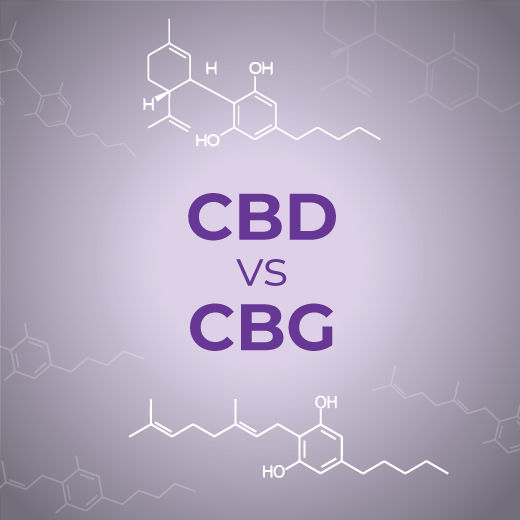CBG vs. CBD: What You Need to Know
Aug 14th 2020
Move over, CBD, there’s a new kid in town slowly taking the spotlight in the world of wellness—CBG! Okay, technically, CBG isn’t that new. In fact, just like CBD, it has been around for a long time. The plant itself has existed for thousands of years.
But with the continuing popularity of CBD, with CBD skincare and wellness products popping up and a bunch of CBD oil for sale in the market, companies are beginning to offer products centered around one of the other 100+ cannabinoids found in the cannabis plant, this includes CBG.
CBG has become a rising star rivaling CBD. But what is it really and how is it different from CBD? We have broken down everything you ought to know to guide you better!
The Definition
First off, it’s important to know about the Cannabis Sativa plant, which has been around for 30 million years. This plant contains 113+ naturally occurring, active compounds which are called cannabinoids.
What is CBD? CBD is one of these cannabinoids. Short for cannabidiol, it is, as mentioned, a chemical compound from the Cannabis Sativa plant. Aside from CBD, another well-known cannabinoid is the THC or Tetrahydrocannabinol (you need to also know this). THC is associated with marijuana’s psychoactive properties. However, unlike THC, CBD does not cause a “high” effect.What is CBG? CBG, on the other hand, stands for cannabigerol. CBG is classified as a minor cannabinoid without psychoactive effects, just like CBD. Starting in an acidic form as CBGA, or cannabigerolic acid, it can transform into its neutral form called CBG.
First discovered by researchers in the 1960’s, CBG is the precursor from which all other cannabinoids are synthesized, which is why it’s often referred to as the “Mother of All Cannabinoids”. Most cannabis genetics only contain trace amounts of CBG, about 1%.
The Differences
On the surface, CBG may sound similar to CBD and while they are both non-psychoactive, they possess features that create key differences between them.
In the early stages of its life cycle, the cannabis plant produces cannabigerolic acid (CBGA). As the plant begins to reach maturity, it will begin to break down the CBGA and convert it to tetrahydrocannabinolic acid (THCA), cannabidiolic acid (CBDA), and cannabichromenic acid (CBCA). From there, the acid forms of each compound will convert to the compounds we are familiar with. CBDA converts to CBD, THCA converts to THC, and CBCA converts to CBC.
Thus, the main difference between CBD and CBG is that they come from different compounds within the cannabis plant and may also serve separate purposes. They are chemically different due to their different physicochemical properties and interactions with the endocannabinoid system.
CBD is known to have a relatively low affinity for cannabinoid receptors and acts mostly through indirect interactions with the endocannabinoid system. While CBG is thought to elicit directly through interaction with the CB1 and CB2 cannabinoid receptors in the brain.
Furthermore, the psychoactive cannabinoid THC also produces its psychoactive effects though interactions with these receptors; CBG has been observed to work as a buffer to THC’s psychoactivity.
The Potential Benefits
While there have been many studies on the potential benefits of CBD and THC, at the moment, research is relatively sparse when it comes to any possible benefits of CBG. However, there are early studies linking CBG to potential therapeutic uses, including:
- CBG may reduce the inflammation associated with inflammatory bowel disease according to a 2013 study conducted on mice.
- A study published in 2008 suggests that CBG might be effective in treating glaucoma. because it reduces intraocular pressure.
- A 2008 study suggests that CBG may be able to kill bacteria.
- A 2016 study on rats suggested that CBG may stimulate the appetite.
Which One Should You Choose?
Being introduced to one doesn’t mean you have to ditch the other. For consumers to feel safe and secured, much more research is needed to fully understand how CBG works in the body, and studies on CBD should likewise continue.
As more studies emerge, we will find how CBD and CBG may offer effects different from each other. So before purchasing either, do your research and read more studies to better understand the respective functions of both CBD and CBG. This way, you will know which one is better for your needs or if it’s best to have both in your life.
Discover CBG in our latest products.
Resources:
- Beneficial Effect of the Non-Psychotropic Plant Cannabinoid Cannabigerol on Experimental Inflammatory Bowel Disease - https://pubmed.ncbi.nlm.nih.gov/23415610/
- Possibilities of Applying Cannabinoids' in the Treatment of Glaucoma - https://pubmed.ncbi.nlm.nih.gov/19112869/
- Antibacterial Cannabinoids From Cannabis Sativa: A Structure-Activity Study - https://pubmed.ncbi.nlm.nih.gov/18681481/
- CBG vs CBD: What Are the Differences? - https://www.analyticalcannabis.com/articles/cbg-vs-cbd-what-are-the-differences-312232#:~:text=Unlike%20CBD%2C%20which%20has%20a,cannabinoid%20receptors%20in%20the%20brain.

